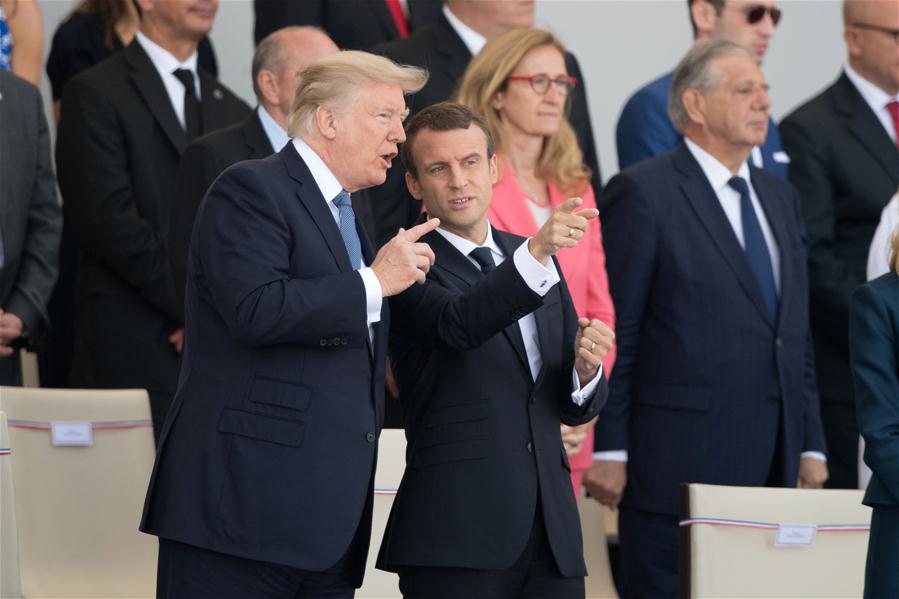
U.S. President Donald Trump (L) talks with French President Emmanuel Macron (R) during the annual Bastille Day military parade on the Concorde Square in Paris, France on July 14, 2017. (Xinhua/Jack Chan)
PARIS, July 15 (Xinhua) -- While U.S. President Donald Trump describes the friendship between the United States and France as "unbreakable," and the country as a "strategic ally," divergence remains regarding climate issues.
"Something could happen with respect to the Paris accord, let's see what happens," said Trump, indicating a possible change in his stance on the Paris Agreement, out of which he pulled the United States in early June.
But whether the U.S. returns to the accord remains to be seen, and no one's holding their breath.
The U.S. president is on his third trip to Europe since taking office and second in a week amid a political crisis at home surrounding a meeting between his son and a Russian lawyer during last year's presidential campaign. The trips come at a time when the relationship between the U.S. and the European Union (EU) has soured.
SHARED VALUES BUT DIFFERENT PATHS
Europe is still adapting to President Trump, although changes are emerging on the continent.
"Six months after Trump one can detect gradually shifting geopolitical alliances and a European gradual self awareness," said Dr. David Criekemans, Assistant Professor in International Politics at the University of Antwerp, Belgium.
"To a certain degree it has strengthened the European cooperation and the realization that EU countries need to work more together."
However, U.S. absence in matters of European and international cooperation on climate protection and global trade has frayed its global image and influence, not to mention that its exit from the Paris Accord aroused criticism from both home and abroad.
"The 'America first policy' is against European policy, which defends open markets. The new American policy is undermining international institutions and a multilateral global order, which is very much supported by the EU," said Gerhard Stahl, former Secretary General of the European Committee of the Regions, an advisory body representing local and regional authorities and their citizens in the EU.
"The policy of the American president is in some key areas in contradiction with the mainstream of European governments and European citizens," he said.
LIVING APART TOGETHER
"If Trump retains his current position on climate change and protecting old industries such as coal, the tensions will remain," said Criekemans.
If the US is not interested in taking part in combating this global challenge, he said, Europe will look to other partners.
"In terms of tackling climate change, countries like China are now seen as better potential partners than the U.S. The EU countries are planning to work less with Washington on climate change and more with some American states directly," he added.
Seen as no more than a diplomatic photo-op, Trump's visit to France drew limited expectations for concrete results, said Stahl.
"The other reason is that President Macron supports clearly the EU policy," he said.
Future relations between the United States and Europe is not clear. But at least one thing is certain: the bond of common values may not be so sticky for either side.
"Basing a relationship on one issue is not enough to make it sustainable," said Alexandra de Hoop Scheffer, Director of the Paris Office of the German Marshall Fund of the United States, a nonpartisan American public policy think tank.
"Macron's initiative to host a climate conference in Paris in December allows him to keep the pressure on Trump. On counter-terrorism, Macron will press Trump to contribute financially to the G5 Sahel anti-jihadist force," she wrote in Le Monde, a French daily newspaper.
The relationship between the EU-US will continue to be defined as "living apart together," largely because of the incoherence of Trump's foreign policy, Criekemans said.















